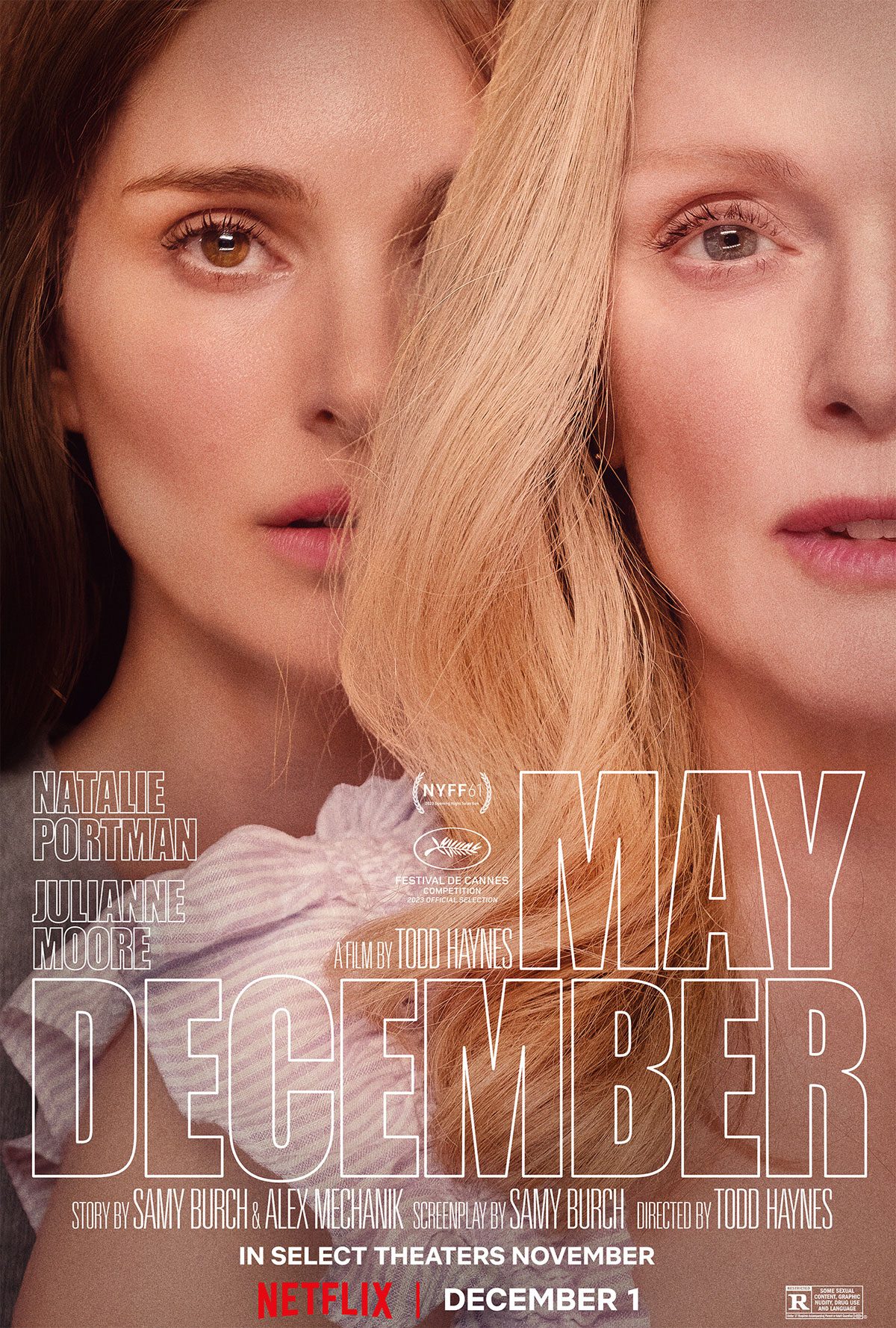
Director: Todd Haynes
Release Year: 2023
Runtime: 1h 57min
Most of us remember Mary Kay Letourneau. She of the why the heck is this attractive 34-year-old teacher having an affair with a twelve-year-old boy? It was 1996, and this shit was shocking. Mostly, again, because Mary Kay was seemingly a functional human with a family, who, again, looked the way she looked. All-American blonde lady that you imagine hosting cocktail parties and sunnily marking up her students’ book reports. But, clearly, underneath she was damaged in some unreconcilable way that pushed her to rape a child, bare his children and attach her soul to this endeavor. May December is more than inspired by this. It is this. Going as far as to cast the beautiful, newly-blonde Julianne Moore in the Mary Kay part and the vaguely ambiguous, but clearly not ethnically white Charles Melton, in the Vili Fualaau role.
Why is all of this important? The casting. The setting. Because it all adds to the psychology of the situation. Joe Yoo (Melton) is clearly an “other” in this lily-white community. That automatically makes this illicit relationship confounding. The same way it was when we saw Mary Kay’ mugshot, and then the news shared the photos of Fualaau with his squirrelly mustache and his — at the time — surprising ambiguousness. When we first heared the story and saw images of Mary Kay, we all probably envisioned her having this affair with the school’s big, strapping QB. Some other all-American-looking, albeit very young, kid. Old-looking for his age. Someone who, despite him being a pre-teen, somehow projected a maturity and, frankly, a whiteness to match Mary Kay’s. So when we saw Fualaau for the first time, the situation somehow became more confounding. Because it further deepened our confusion about why this woman did this. And why this kid? And this is what this film purports to want to get to. Maybe?
My issue is that the filmmaker, Todd Haynes, is clearly interested in this question. He gave Gracie’s (Moore) character a speech impediment, which I suppose we’re suppose to assume automatically puts some sort of self-consciousness in her character. Some deep-seated self-doubt, and a wound that would hurt self-worth. Pair that with what we have to gather is an incredibly critical mother (based on a really painful scene with her daughter where she passive-aggressively criticizes her body in an imitation of her own mother) and this leads her to be a rapist? The real Mary Kay was raised by a philandering, conspiracy-theory-pushing piece of shit named John G. Schmitz, but we don’t really get a backstory from Gracie that might have dented her in a way that would lead to her obvious psychosis. And, yes, Haynes shows us the fact that Gracie is either oblivious or deluded enough to believe that she did nothing wrong — along with the fact she is psychically fragile and treated with kid gloves by her family — but we don’t really know or understand why. Yes, she’s damaged and a little touched, but it’s unclear if she’s always been like this, or lead to this place after being jailed for child-raping her now husband and being a local pariah. A son from her first marriage tells us later on that he read her diary, and that she was sexually abused as child, but the son is both unreliable and that fact/fiction is just that, and not an exploration of why that abuse lead to then abusing a child in the same way. The connection and exploration feels more like a convenient drop-in than a deeper dive on the psychology of the situation. Which, again, I think is Haynes’ intention.
And then we add in the Elizabeth (Natalie Portman) character. It’s a little unclear from the jump what her role is in the scheme of things. Narratively she’s an actress there to embed herself with Gracie and Joe to study for a part in an indie film about their lives. She’s set to play Gracie, of course. Is she supposed to be the audience avatar? To be there to ask all the probing questions we want to ask Gracie/Mary Kay about what would cause this woman to engage in a rape-relationship with a child. To blow up her marriage and her family for the chance to hook up with said child. It’s a fascinating study, after all. And Elizabeth, in her research, does uncover a little bit of the psychology behind Gracie’s decision, but she honestly uncovers more of Joe’s. But — and this is where I think the movie goes a little wobbly — as Elizabeth goes a little Single White Female on the situation, we then have to shift to her motivations. And her psychology. Is her brain broken by the situation? Or is she just an asshole who sees awards in her future? We have no concept of her motivations and mental state, so why now do we have to split our focus? Are Joe and Gracie not worthy of our full attention? I just found the Elizabeth character confusing. Is it Haynes’ commentary on method actors? Is it some meta whatever about Black Swan? Her character helps uncover some of the psychic damage of the Joe character and highlight his immaturity and semi-suspended childhood, but we have more subtle examples of that weaved in the film. Her involvement just makes everything super-overt. Which we didn’t need.
When it comes down to it, I seem to be putting a lot of the things I didn’t find satisfying in this film on Todd Haynes. I’m honestly not at all familiar with his oeuvre, outside of his weirdo Superstar: The Karen Carpenter Story, which I saw in a college film class thirty years ago. I can’t say I vibed with that film — it staring a bunch of Barbie Dolls, and from what I recall involved a really gross scene with a box of Ex-Lax. And maybe these shortcomings are more a result of the writers (of which Haynes doesn’t look to be one) and not his decisions, but my enjoyment of the film was definitely tempered mostly by the Elizabeth stuff. Again, there is an interesting dramatic film here, but the tone was a little funky and uneven (sometimes even leaning into what almost, kinda felt like satire?). Anyhow, there are scenes throughout that are memorable and the acting is top-notch. But I did walk away from it wondering what the hell was up with Natalie Portman.


